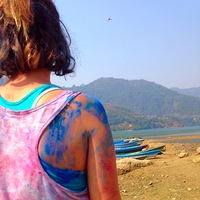На Адриатике шторм. Мне кажется, я единственный иностранный отдыхающий на побережье. Но пост не об этом. И даже не о том, что я в футболке на берегу моря, а вы, дорогие согорожане, тоже на берегу моря, но без, так сказать, футболки.
Так вот. За почти неделю в Албании, мной были опрошенны 15 молодых женщин разных профессий, вероисповеданий и места жительства. Меня интересовало, что они думают о феномене бурнеш. Напомню незадачливым читателям, что бурнешами на Балканах называют девушку дающую обет безбрачия и становящуюся для общества, как бы мужчиной. Их ещё называют клятвенными девственницами. Обитают бурнеши, как правило, в Проклятых горах, на севере страны. BBC, Russia Today и прочие незаслуживающие внимание телеканалы делают про них миллионы сюжетов в год, с опросами, фотографированием, ситуациями.
Что интересно? Ни одна из 15 опрошенных мною албанок (включая научного сотрудника этнографическо музея) "не знала" о подобной традиции. Кровная месть - да, браки через сватовство - да. Бурнеши - нет.
При чём, каждый раз после того как подымался этот вопрос - менялся голос девушки и они старались побыстрее закончить разговор или переключить тему.
Единственное, что мне удалось добиться от них, что термин такой действительно существует. Якобы, остальные албанки, так называют девушек спускающихся с Проклятых гор, и это слово "бурнеша" подчёркивает суровый нрав северных дам. Но!
" Никто мужчиной не становится, Канун такого не разрешает, все это ложь и провокация и вообще мне пора, have a Good day, все такое".
Так вот. За почти неделю в Албании, мной были опрошенны 15 молодых женщин разных профессий, вероисповеданий и места жительства. Меня интересовало, что они думают о феномене бурнеш. Напомню незадачливым читателям, что бурнешами на Балканах называют девушку дающую обет безбрачия и становящуюся для общества, как бы мужчиной. Их ещё называют клятвенными девственницами. Обитают бурнеши, как правило, в Проклятых горах, на севере страны. BBC, Russia Today и прочие незаслуживающие внимание телеканалы делают про них миллионы сюжетов в год, с опросами, фотографированием, ситуациями.
Что интересно? Ни одна из 15 опрошенных мною албанок (включая научного сотрудника этнографическо музея) "не знала" о подобной традиции. Кровная месть - да, браки через сватовство - да. Бурнеши - нет.
При чём, каждый раз после того как подымался этот вопрос - менялся голос девушки и они старались побыстрее закончить разговор или переключить тему.
Единственное, что мне удалось добиться от них, что термин такой действительно существует. Якобы, остальные албанки, так называют девушек спускающихся с Проклятых гор, и это слово "бурнеша" подчёркивает суровый нрав северных дам. Но!
" Никто мужчиной не становится, Канун такого не разрешает, все это ложь и провокация и вообще мне пора, have a Good day, все такое".
On the Adriatic storm. I think I'm the only foreign vacationer on the coast. But the post is not about that. And not even about the fact that I am in a T-shirt on the seashore, and you, dear fellow citizens, are also on the seashore, but without, so to speak, T-shirts.
So here. For almost a week in Albania, I interviewed 15 young women of different professions, religions and places of residence. I wondered what they thought about the phenomenon of Bourne. Let me remind the hapless readers that in the Balkans the name of a girl who takes a vow of celibacy and becomes for the society, as a man, is called a burne in the Balkans. They are also called oath virgins. Burneshes live, as a rule, in the Damned Mountains, in the north of the country. BBC, Russia Today and other undeserved television channels make millions of stories about them a year, with polls, photographs, situations.
Interestingly? None of the 15 Albanians I interviewed (including the research officer of the ethnographic museum) “knew” about this tradition. Blood revenge - yes, marriage through matchmaking - yes. Burneshi - no.
Moreover, every time after this question was raised, the voice of the girl changed and they tried to quickly end the conversation or switch the topic.
The only thing I managed to achieve from them was that the term really exists. Allegedly, the rest of the Albanians, as they call the girls coming down from the Damned Mountains, and this word “burnesha” emphasizes the harsh temper of the northern ladies. But!
"Nobody becomes a man, Eve does not allow this, all this is a lie and a provocation, and in general it is time for me to have a Good day, everything like that."
So here. For almost a week in Albania, I interviewed 15 young women of different professions, religions and places of residence. I wondered what they thought about the phenomenon of Bourne. Let me remind the hapless readers that in the Balkans the name of a girl who takes a vow of celibacy and becomes for the society, as a man, is called a burne in the Balkans. They are also called oath virgins. Burneshes live, as a rule, in the Damned Mountains, in the north of the country. BBC, Russia Today and other undeserved television channels make millions of stories about them a year, with polls, photographs, situations.
Interestingly? None of the 15 Albanians I interviewed (including the research officer of the ethnographic museum) “knew” about this tradition. Blood revenge - yes, marriage through matchmaking - yes. Burneshi - no.
Moreover, every time after this question was raised, the voice of the girl changed and they tried to quickly end the conversation or switch the topic.
The only thing I managed to achieve from them was that the term really exists. Allegedly, the rest of the Albanians, as they call the girls coming down from the Damned Mountains, and this word “burnesha” emphasizes the harsh temper of the northern ladies. But!
"Nobody becomes a man, Eve does not allow this, all this is a lie and a provocation, and in general it is time for me to have a Good day, everything like that."

У записи 53 лайков,
0 репостов,
960 просмотров.
0 репостов,
960 просмотров.
Эту запись оставил(а) на своей стене Леонид Ланда







































































